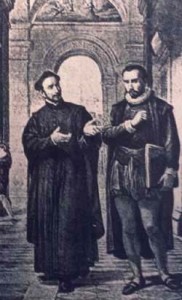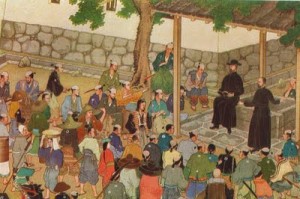Francis Xavier (1506 – 1552) was born into an aristocratic family in the Kingdom of Navarre (now part of Spain). He grew up surrounded by war. Francis’ brothers were soldiers. They participated in a failed Navarrese-French attempt to expel the Spanish invaders from the kingdom. After 18 years, the war ended with the Kingdom of Navarre being partitioned into two territories: the King and some loyalists abandoned the south and moved to what is now France.
Instead of going into the military like his brothers, Francis chose a life of study in Paris. He was a promising scholar, an athlete, proud, somewhat wild, and ambitious to get ahead. There he met a man fifteen years older than him, a former soldier who had experienced a profound conversion while recuperating from a war injury, who would eventually become St. Ignatius of Loyola. Ignatius worked hard to win him over as a friend and eventually opened Francis’s heart to the love of Christ. Together they founded the Society of Jesus (Jesuits).
Francis led an extensive mission into Asia. He was influential in the spreading of Catholicism in India, Borneo, Japan, and other areas which had thus far not been visited by Christian missionaries. Though it seemed his missionary work in Japan was destroyed by persecution, three centuries later, missionaries were amazed to discover tens of thousands of “hidden Christians” still living in the area of Nagasaki. The Catholic Church that was built in Nagasaki then became ground zero for the second atomic bomb that the United States dropped on Japan. “What the Japanese Imperial government could not do in over 200 years of persecution, destroy Japanese Christianity, American Christians did in nine seconds.” — Dr. Gary G. Kohls

